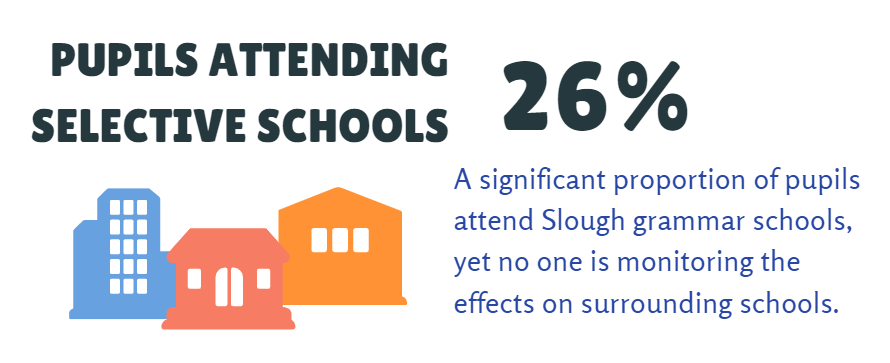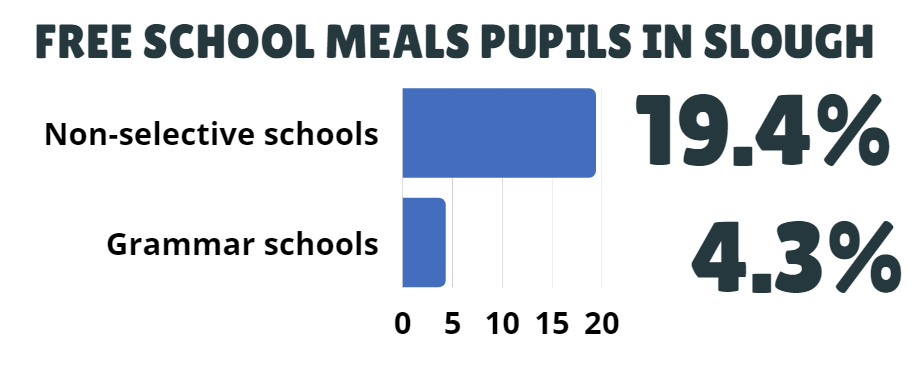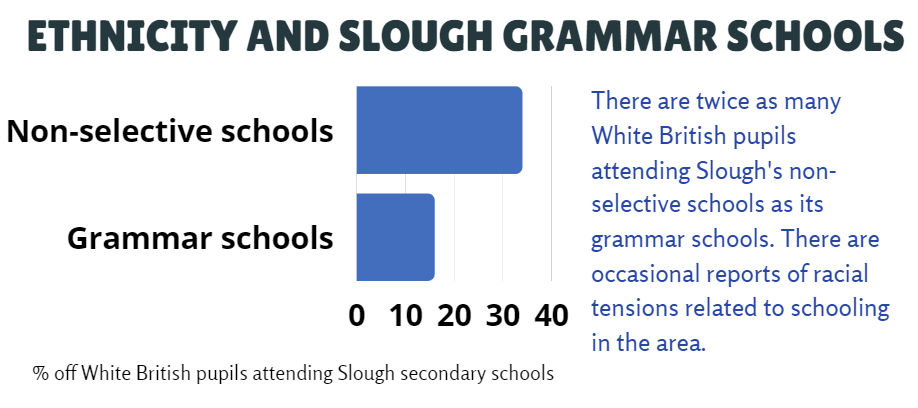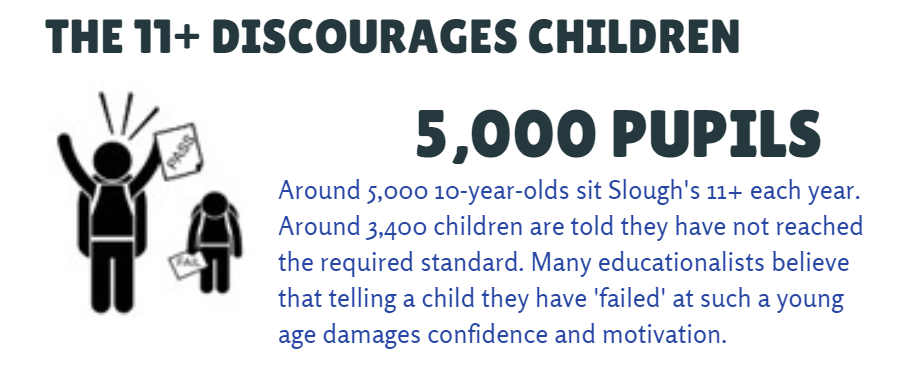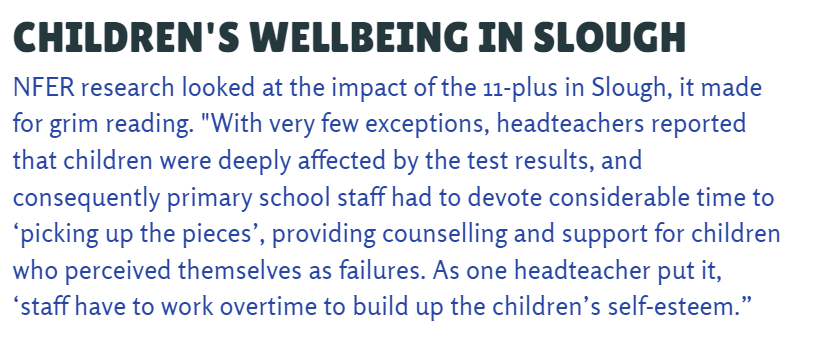 Selective education guide – Slough
Selective education guide – Slough
BACKGROUND
Slough has four grammar schools which educate a very high proportion of higher attaining students from Slough itself and the surrounding area.
Check out our map of selective schools in England to find out more about these schools. The map gives the percentage of disadvantaged pupils, the percentage of pupils attending a grammar school who are likely to have come from a fee-paying ‘prep’ school, and the relative selectivity of every grammar school in Slough. View the map HERE.
Or, to read stories from parents and teachers experiencing selective education in Slough visit the 11+ Anonymous site HERE.
THE PROBLEMS
In every area where academic selection still exists there are some common problems. For example,
- Grammar schools admit fewer disadvantaged pupils than non-selective schools. Grammar schools are also more likely to admit pupils from more advantaged families.
- A significant number of pupils previously educated in fee-paying ‘prep’ schools take up grammar school places.
- Tuition for the 11-plus ‘buys advantage’. Better-off families can afford private coaching while poorer families can feel compelled to pay for tuition they can ill afford.
- Sitting the 11-plus is stressful and can damage a child’s confidence.
- The 11-plus has been proven to lack accuracy because it takes place while children are still developing academically.
- Research shows the proportion of children with Special Educational Needs (SEN) attending grammar schools is small. For many children with additional learning needs such as dyslexia and attention deficit disorders, the 11-plus test is inaccessible. The same children often perform very well academically outside a test situation.
- Grammar schools change the pupil profile of other schools in the area. If a large number of higher attaining pupils attend grammar schools then surrounding schools find themselves with a pupil population which is skewed, with a disproportionate amount of moderate and lower attaining pupils and pupils with additional learning needs. This impacts on subject choice (fewer subjects available than at a grammar school) and teacher recruitment. Non-selective schools in areas with grammar schools cannot be ‘true’ comprehensives and tend to underperform compared to comprehensive schools.
- GCSE results in areas with grammar schools are on a par, or worse, than areas that have only comprehensive schools. Research has shown that children who attend selective schools are likely to achieve broadly the same results as in a non-selective school.
The percentage of pupils attending grammar schools in Slough
A high proportion of pupils in Slough attend selective schools, with 26% of secondary school pupils attending grammar schools. This means there will be a significant impact on surrounding schools. The Department for Education (DfE) classes Slough as a ‘highly selective’ authority.
Although the DfE acknowledges that selective areas such as Slough are offering a different type of education than other areas of England, their selection processes are not scrutinised. The lack of checks and reporting requirements means the full impact of a selective school system cannot be studied. There are many aspects of selection which remain shrouded in secrecy.
A social divide in Slough’s secondary schools
There are relatively few disadvantaged pupils in Slough’s grammar schools. Non-selective schools have a far greater proportion of pupils on free school meals. This creates a social divide which impacts the whole of Slough, not just its schools.
Are racial tensions encouraged by selective education in Slough?
Selective education can encourage school divides based on class and ethnicity. It’s a sad fact that racial tensions occasionally arise due to the low proportion of white pupils attending Slough grammar schools. These kind of divisions would be less likely if there were no selective schools.
11-plus tuition businesses profit from anxious parents in Slough
Although some 11-plus test companies claim that their tests are ‘tutor proof’ most parents believe otherwise. Parents can spend thousands of pounds preparing children for 11-plus tests. Test tuition means the test isn’t a level playing field. Children from more comfortably off backgrounds are more likely to be have received coaching and are therefore more likely to pass the test and gain a grammar school place.
The 11-plus damages children’s confidence
Research shows the 11-plus damages children’s wellbeing
Many children feel demotivated by a ‘fail’ in the 11-plus. A paper studying the impact of selection in Slough found many children suffered from low self-esteem when they failed the test.
Comprehensive Future believes all children should start secondary school feeling positive about their academic ability. The vast majority of England’s children thrive in schools which do not select and there is no evidence to show that the 11-plus is an effective and accurate way to decide a child’s educational future. We believe it is time to end selection and phase out the 11-plus.
More information
You can read more information about Slough grammar schools and the 11-plus by visiting the Slough Consortium of Grammar Schools website.
Want to end the 11-plus in Slough?
Join Comprehensive Future’s campaign to end the 11-plus.
To learn about the data sources for our interactive map and selective education guides click here. If you spot any errors in the data for any area, please let us know.


